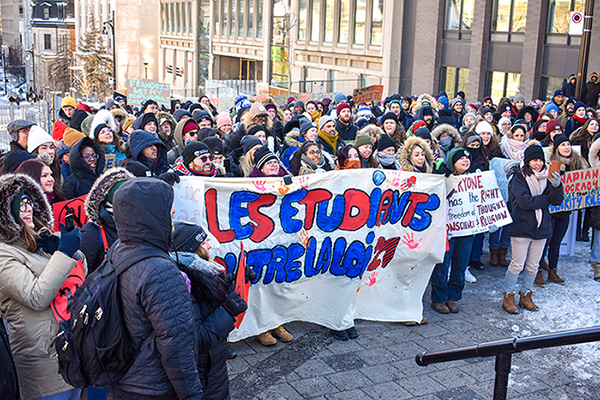Despite the extreme cold on Jan. 17, hundreds marched from McTavish Street to the Ministry of Immigration in protest of Bill 21—a law passed by the Quebec government, prohibiting public servants from wearing religious symbols at work. Organized by student unions, including the Students’ Society of McGill University (SSMU) External Affairs, the Education Undergraduate Society (EdUS), and Université du Québec à Montréal’s l’Association des étudiantes et étudiants de la faculté des sciences de l’éducation and l’Association facultaire étudiante de science politique et droit, the protest demanded a full repeal of Bill 21, and for McGill and other universities to take a more hardline stance against the legislation.
Hanadi Saad, co-founder of Justice Femme, explained how hate crimes have increased since the passage of Bill 21 in June 2019. Adam Gwiazda-Amsel, SSMU Vice-President (VP) External, discussed the bill’s repercussions on campus and the purpose of the protest.
“[The protest] is not just about the abolition of the bill, but [also] to get the university to come out much more strongly against it,” Gwiazda-Amsel said. “Even students who don’t wear visible religious symbols are racialized, [and they’re] being told that they’re not welcome in Quebec.”
The protest was part of a two-day strike by undergraduate students in the Faculty of Education on Jan. 17 and 20. Zeina Jhaish, U2 Education, believes that Bill 21 is contradictory to the field of education as a whole.
“I think that Bill 21 completely undermines our profession, and does not correlate with the core values of education,” Jhaish said. “Education is about empathy, care, acceptance, and inclusivity but Bill 21 does not believe in that I think that the rest of McGill should really look at the values that [the Faculty of Education] is trying to uphold, because I feel like we should become stronger as a university against these issues.”
Janah Hajjsleiman, a protestor and a CEGEP student, expressed the importance of her religion and faith in spite of discrimination.
“The hijab is not a game. I respect it and it’s a part of my religion, and if I respect my religion, I respect my hijab, so why would I want to risk [my faith] for your comfort?” Hajjsleiman said. “At the end of the day, [there are] different people in the world, [and] if you really want to be scared of each person [who is] different from you, how [will we] progress?”
The protest exists alongside other forms of campus activism, including McGill Against Bill 21—a group reserved for students to mobilize, share articles, and provide support for one another. McGill Against Bill 21 falls under the External Affairs portfolio, spearheaded by Gwiazda-Amsel.
“The idea [behind the group] is to have a centralized planning hub, both for actions against Bill 21, but also to make sure that students feel supported,” Gwiazda-Amsel said. “[…] A lot of students feel alone right now, so it’s important for them to know that [we] support them. We’re also educating other people about the bill.”
Similarly to EdUS, the Arts Undergraduate Society tried to pass a motion to strike in a Jan. 17 General Assembly that failed to reach quorum. Gwiazda-Amsel explains that the most important thing for students to take away from the protest is to get involved with faculty associations.
“The faculties are the ones who are closest to students,” Gwiazda-Amsel said. “SSMU does not really have the position to mobilize students from the ground, [however], what we can do is support faculties that do go on strikes […] Faculty associations have the power to get together and organize their own students, and [SSMU] will help anyway we can.”









